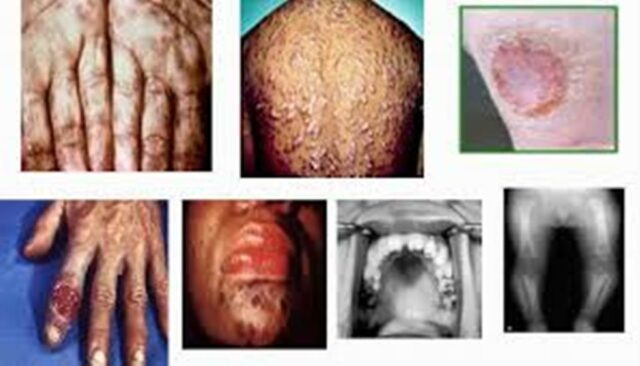Relaxation in the use of condoms is one of the causes of the increase in cases of gonorrhea, syphilis, and chlamydia. We explain the consequences of suffering from any of these infections whose incidence is increasing.
Gonorrhea, syphilis, and chlamydia share some common characteristics:
- They have their origin in different bacteria that are fought with antibiotics;
- Any person with sexual activity can contract and transmit them;
- They are characterized, at least initially, by having nonspecific symptoms.
The best way to avoid these infections is with the use of a condom in any vaginal, anal or oral sexual intercourse. A contraceptive method whose use among young people has been reduced from 84% to 75% in the last 16 years, especially in adolescents between 15 and 18 years old, according to data from the Ministry of Health.

Advances in diagnostic methods have also made it possible to detect earlier these infections, which usually present with nonspecific symptoms. According to Dr. Mariam de la Poza, urethritis (an infection that affects the urethra) is one of the most common symptoms in gonorrhea and chlamydia, diseases that are treated with a combination of antibiotics, while syphilis is fought with penicillin.
The cases of gonorrhea and chlamydia occur more in the group of 15 to 25 years, while syphilis is more common in older people, according to estimates by the family doctor.
Gonorrhea, the highest rate
Gonorrhea infection reaches the highest rate, 78.1 per 100,000 inhabitants, in the population between 20 and 24 years of age, according to Health. The cause is in the bacterium Neisseria Gonorrhoeae or gonococcus that is transmitted in sexual relations without condoms.
When the symptoms are present the most common are, in women, a change in the color or odor or amount of vaginal discharge, bleeding between periods or more numerous periods, a burning sensation when urinating; there may be pain or discomfort in the lower abdomen. In men, burning sensation when urinating; discharge from the end of the penis; there may be a pain in the testicles.
Diagnosis
A sample from the genital, pharyngeal, or anal area is needed to make the diagnosis, depending on sexual practices. Sometimes a urine sample may also be requested.
Complications
Women can develop the pelvic inflammatory disease, which can cause pain in the abdomen and pelvis. It can also lead to infertility and ectopic (outside the uterus) pregnancy. Men can develop a painful infection in the testicles. In some cases, when gonorrhea has not been treated, it can lead to infections in other regions of the body, such as the skin and joints. Testing for other sexually transmitted infections such as syphilis, chlamydia, and HIV is a good idea as there may be more than one infection at the same time.
Syphilis, more common in men
Syphilis infection registered a less marked increase, but in 2017 the highest rates occurred since the data were collected, 10.61 per 100,000 inhabitants compared to 2.57 registered in 1995.
It appears more in men than in women. The age group most affected is that of 25 to 34 years. The cause is due to the bacterium Treponema Pallidum that is transmitted in vaginal, anal, or oral sex.It is diagnosed with a blood test.
The infection has four stages:
Primary syphilis: an ulcer appears on the part of the body that has been in contact with the bacteria. It can go unnoticed depending on its location and is an important route of infection for sexual partners.
Secondary syphilis: Bacteria proliferate in the blood and the disease progresses 3-6 weeks after the appearance of the ulcer.
Latent syphilis: When the symptoms of secondary syphilis have disappeared, symptoms may not occur for several years, but the infection is present and can be detected through a blood test.
Tertiary syphilis: About 1 in 10 people with untreated syphilis will develop serious neurological, osteoarticular, or heart problems many years after infection.
Complications: In 1 in 10 cases, if syphilis has not been treated, the infection can be transmitted to other organs through the blood, and cause, after many years, heart, brain or osteoarticular disorders.
Chlamydia, more common in women
In the case of chlamydial infection, the highest rates were between 20 and 24 years and more in women than in men.A sexually transmitted disease caused by the bacteria Chlamydia Trachomatis.More than 70% of women and 50% of men with chlamydia infection have no specific symptoms.
Warning signs in women
Changes in the color, odor, or amount of vaginal discharge; heavier periods or bleeding between periods; bleeding after sexual intercourse; burning sensation when urinating; pain or discomfort in the lower abdomen.
Red flags in men
Burning sensation when urinating; discharge from the end of the penis, pain or discomfort in the testicles.
Diagnosis
A sample from the genital area is needed. Sometimes a urinalysis may also be requested.
Consequences
Without treatment, women can develop pelvic inflammatory disease. This disease can cause abdominal and pelvic pain. It can also cause infertility and ectopic pregnancies. Men can develop a very painful infection in the testicles. Less frequently, it can cause other symptoms such as arthritis (Reiter’s syndrome) and eye inflammation.

